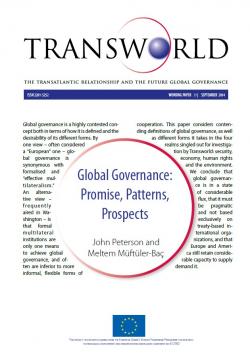Global Governance: Promise, Patterns, Prospects
Global governance is a highly contested concept both in terms of how it is defined and the desirability of its different forms. By one view - often considered a "European" one - global governance is synonymous with formalised and "effective multilateralism." An alternative view - frequently aired in Washington - is that formal multilateral institutions are only one means to achieve global governance, and often are inferior to more informal, flexible forms of cooperation. This paper considers contending definitions of global governance, as well as different forms it takes in the four realms singled out for investigation by Transworld: security, economy, human rights and the environment. We conclude that global governance is in a state of considerable flux, that it must be pragmatic and not based exclusively on treaty-based international organizations, and that Europe and America still retain considerable capacity to supply demand it.
Paper produced within the framework of the IAI project Transworld.
-
Details
Roma, Istituto affari internazionali, September 2014, 23 p. -
Issue
39
Introduction
1. Global Governance: "Virtually Anything"?
2. Security and Global Governance
3. Global Economic Governance
4. Global Environmental Governance
5. Global Governance of Human Rights
Conclusion
References



